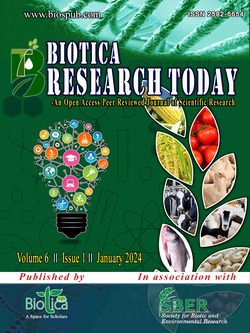
Cyanobacteria: A Potential Microalgae for Climate Smart Rice Cultivation
Joseph Ezra John
Tamil Nadu Climate Change Mission, Government of Tamil Nadu, Chennai, Tamil Nadu (600 015), India
Chidamparam Poornachandhra*
Dept. of Environmental Sciences, Tamil Nadu Agricultural University, Coimbatore, Tamil Nadu (641 603), India
Arunachalam Lakshmanan
Dean (SPGS), Tamil Nadu Agricultural University, Coimbatore, Tamil Nadu (641 603), India
DOI: NIL
Keywords: Carbon Sequestration, Climate smart agriculture, Cyanobacteria, Paddy
Abstract
Soil carbon sequestration is a significant strategy for lowering atmospheric CO2 emissions and mitigating negative environmental effects. The use of Cyanobacterial or Blue Green Algal systems (BGA) for long-term sequestration of CO2 is a promising solution to reduce the CO2 content in atmosphere. Cyanobacteria are suitable candidates in carbon sequestration as they are easier to grow in paddy fields. Understanding the process of organic and inorganic carbon sequestration mediated by Cyanobacteria and the possibility of controlling these processes are necessary to develop a technology for CO2 sequestration in rice soils. Rice cultivation with Cyanobacterial biofertilization could also reduce the carbon footprint by reducing fertilizer requirement and carbon enrichment as mineral carbonates. Their potential for carbon sequestration and enhancement of grain yield could be explored for climate smart adaptation in cultivation of rice.
Downloads
not found
Reference
Blondeau, M., Sachse, M., Boulogne, C., Gillet, C., Guigner, J.M., Skouri-Panet, F., Poinsot, M., Ferard, C., Miot, J., Benzerara, K., 2018. Amorphous calcium carbonate granules form within an intracellular compartment in calcifying cyanobacteria. Frontiers in Microbiology 9, 1768. DOI: https://doi.org/10.3389/fmicb.2018.01768.
Qian, H., Zhu, X., Huang, S., Linquist, B., Kuzyakov, Y., Wassmann, R., Minamikawa, K., Martinez-Eixarch, M., Yan, X., Zhou, F., Sander, B.O., Zhang, W., Shang, Z., Zou, J., Zheng, X., Li, G., Liu, Z., Wang, S., Ding, Y., Groenigen, K.J., Jiang, Y., 2023. Greenhouse gas emissions and mitigation in rice agriculture. Nature Reviews Earth & Environment 4(10), 716-732. DOI: https://doi.org/10.1038/s43017-023-00482-1.
Singh, J.S., Arun, K., Rai, A.N., Singh, D.P., 2016. Cyanobacteria: A precious bio-resource in agriculture, ecosystem, and environmental sustainability. Frontiers in Microbiology 7, 529. DOI: https://doi.org/10.3389/fmicb.2016.00529.
Song, J., He, X., Wang, S., Yang, X., Wu, L., Li, S., Wang, D., Yang, M., Wu, Z., 2022. Community composition specificities of cyanobacteria in paddy soil under different ecological conditions. Agronomy 12(12), 3090. DOI: https://doi.org/10.3390/agronomy12123090.
Zhang, J., Song, X., Wei, H., Zhou, W., Peng, C., Li, D., 2021. Effect of substituting nitrogen fertilizer with nitrogen-fixing cyanobacteria on yield in a double-rice cropping system in southern China. Journal of Applied Phycology 33, 2221-2232. DOI: https://doi.org/10.1007/s10811-021-02455-7.
